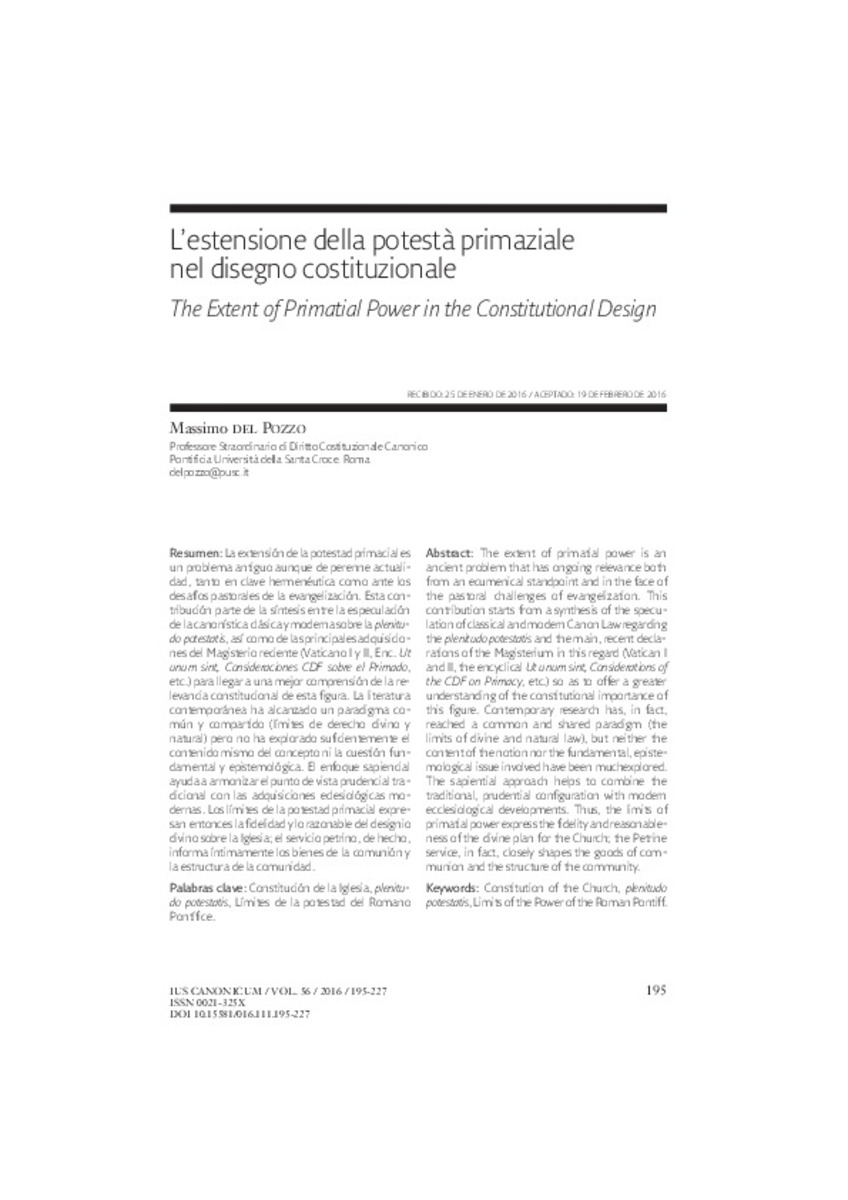Full metadata record
| DC Field | Value | Language |
|---|---|---|
| dc.creator | Del-Pozzo, M. (Massimo) | - |
| dc.date.accessioned | 2018-06-11T10:17:40Z | - |
| dc.date.available | 2018-06-11T10:17:40Z | - |
| dc.date.issued | 2016 | - |
| dc.identifier.citation | Del-Pozzo, M. (Massimo) | es |
| dc.identifier.issn | 0021-325X | - |
| dc.identifier.uri | https://hdl.handle.net/10171/53089 | - |
| dc.description.abstract | La extensión de la potestad primacial es un problema antiguo aunque de perenne actualidad, tanto en clave hermenéutica como ante los desafíos pastorales de la evangelización. Esta contribución parte de la síntesis entre la especulación de la canonística clásica y moderna sobre la plenitudo potestatis, así como de las principales adquisiciones del Magisterio reciente (Vaticano I y II, Enc. Ut unum sint, Consideraciones CDF sobre el Primado, etc.) para llegar a una mejor comprensión de la relevancia constitucional de esta figura. La literatura contemporánea ha alcanzado un paradigma común y compartido (límites de derecho divino y natural) pero no ha explorado suficientemente el contenido mismo del concepto ni la cuestión fundamental y epistemológica. El enfoque sapiencial ayuda a armonizar el punto de vista prudencial tradicional con las adquisiciones eclesiológicas modernas. Los límites de la potestad primacial expresan entonces la fidelidad y lo razonable del designio divino sobre la Iglesia; el servicio petrino, de hecho, informa íntimamente los bienes de la comunión y la estructura de la comunidad. | - |
| dc.description.abstract | The extent of primatial power is an ancient problem that has ongoing relevance both from an ecumenical standpoint and in the face of the pastoral challenges of evangelization. This contribution starts from a synthesis of the speculation of classical and modern Canon Law regarding the plenitudo potestatis and the main, recent declarations of the Magisterium in this regard (Vatican I and II, the encyclical Ut unum sint, Considerations of the CDF on Primacy, etc.) so as to offer a greater understanding of the constitutional importance of this figure. Contemporary research has, in fact, reached a common and shared paradigm (the limits of divine and natural law), but neither the content of the notion nor the fundamental, epistemological issue involved have been muchexplored. The sapiential approach helps to combine the traditional, prudential configuration with modern ecclesiological developments. Thus, the limits of primatial power express the fidelity and reasonableness of the divine plan for the Church; the Petrine service, in fact, closely shapes the goods of communion and the structure of the community. | - |
| dc.language.iso | spa | - |
| dc.publisher | Servicio de Publicaciones de la Universidad de Navarra | - |
| dc.rights | info:eu-repo/semantics/openAccess | - |
| dc.subject | Constitución de la Iglesia | - |
| dc.subject | plenitudo potestatis | - |
| dc.subject | Límites de la potestad del Romano Pontífice | - |
| dc.subject | Constitution of the Church | - |
| dc.subject | plenitudo potestatis | - |
| dc.subject | Limits of the Power of the Roman Pontiff | - |
| dc.title | L’estensione della potestà primaziale nel disegno costituzionale | - |
| dc.title.alternative | The Extent of Primatial Power in the Constitutional Design | - |
| dc.type | info:eu-repo/semantics/article | - |
| dc.identifier.doi | 10.15581/016.111.195-227 | es_ES |
| dadun.citation.endingPage | 227 | - |
| dadun.citation.number | 111 | - |
| dadun.citation.publicationName | Ius Canonicum | - |
| dadun.citation.startingPage | 195 | - |
| dadun.citation.volume | 56 | - |
| dc.date.updated | 2018-06-11T10:17:40Z | - |
| dc.description.version | Peer Reviewed | - |
Files in This Item:
Statistics and impact
Items in Dadun are protected by copyright, with all rights reserved, unless otherwise indicated.






